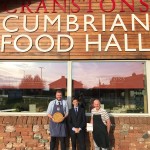For many decades, Cumbrian planners have tried to create economic growth by backing large Cumbrian industries. This is understandable because our industrial revolution was a miracle. The slow growth of our traditional rural economy, celebrated by Wordsworth, was blown apart in the second half of the nineteenth century, as we tore into the land, extracting slate and iron ore, and above all coal. In the fifty years leading up to the First World War, coal production quadrupled. Pits, and then factories, provided employment for tens of thousands. Cumbrian farmers poured from the fellsides to the West Coast, ribbons of brick nineteenth-century terraces emerged on bare moorland, grand municipal buildings dominated new towns – and the owners, at least, became very wealthy.
But our Cumbrian industry was far more fragile than the industry of the Midlands or indeed the American mid-West. And this reflected fundamental facts of geography. Cumbrian factories were too far from major population centres. They were neither able to access the quantity of labour, nor were they close enough to a mass customer base. So Cumbria was already in trouble before German and US manufacturing began to outcompete Britain in the 1890s, and long before coal production and employment began its decline in 1914. By 1930 most of the population of West Cumbria was unemployed. And it was already clear that it was going to find it very difficult to sustain any industries into the future.
Cumbria chose to resist the flow of this economic history. The champion of the policy was Jack Adams, who drove Cumbrian investments from 1920 to 1960. First as a Labour councillor and then as the Chief of the “Cumberland Development Council” and the “West Cumberland Industrial Development Co. Ltd”, he brought government loans and guarantees to reintroduce industries ranging from silk-weaving and soap, to the manufacture of fissile material for nuclear bombs. Great energy – and often a great deal of government money – was devoted to persuading businessmen such as the Hungarians Mike Sekers and Tomi de Gara in 1938, and the Austrian Frank Schon in 1940, to locate their factories in Cumbria. The Wigton factory, which prints the five pound note, is a survivor of this period. But the fundamental barriers of our remote location, and low population remained. And most of these enterprises ultimately collapsed – in some cases, it was a change in global markets; in others, the owners left when the subsidies dried up, and sold the equipment to India.
Some of the attempts to bring industry back were more tragic. The Williams coal mine at Whitehaven – famous for its poor ventilation and working methods – had become unprofitable by the 1920s, and went bankrupt in 1933, by which time it had, according to the Chief inspector ‘probably the blackest record in the annals of coal mining” with four major explosions in the previous twenty years (in one of which 136 people had been killed). But undeterred, Jack Adams – whose own father had been killed in a mining accident when he was four – persuaded the charity, the Nuffield Trust to issue a substantial loan to reopen the pit in 1937. The new owners embarked on a highly expensive program of improvements, at the end of which, there was another explosion at the mine killing 104 men. Shortly after Adams had been made a hereditary peer by the Atlee government – in recognition of his attempts to sustain such industries – the National Coal Board finally closed the mine.
None of the valiant efforts of development corporations, politicians and the treasury over eighty years were able to create enduring industrial prosperity in West Cumbria. It remains one of the most deprived areas in Britain. And only the special government cases of the nuclear and the defence industry – still backed by Billions of pounds from tax-payers – were able in the long-term to escape the pressures of the global markets.
Meanwhile, East Cumbria, which received very little attention, almost no industrial subsidy, and has never matched traditional models for economic growth – took off. Its very lack of factories – once decried – proved increasingly to be the secret of its success, because it preserved an unspoilt landscape, which attracted talented people to work, and millions of tourists to visit. Its growth and employment did not come from large employers, but from tens of thousands of micro-businesses, which remain to this day largely unstudied, and unrecorded. Their sheer diversity – from guitar design, to drone mapping, from UV water purification, to chocolate pudding manufacture – is the key to the area’s resilience. It is not vulnerable to the sudden collapse of sectors employing thousands.
Which leaves me with a thought. When planners talk about growth in Cumbria they still seem to think in terms of factories, and subsidising large employers. But what would have happened if over the last century, instead of trying to re-industrialise Cumbria, the same energy and resources had been invested in sensitively preserving and developing the skills and environment which could support our rural heritage and micro-businesses. Adams would answer that it was neither realistic nor just to expect ex-industrial workers to flourish in small (and to his mind insecure and low wage) rural businesses. But I still feel we could have done much more to follow the path of rural development of Switzerland or the Austrian Alps – developing an economy based on an upland landscape, on small farms, on high quality food, on small business and on high-end tourism. What, in short, if, Cumbria had pursued an industrial policy which embraced our remote location, and sparse population, our unique landscape and history, instead of trying to fight our identity?
 Penrith and The Border MP Rory Stewart, together with his parliamentary colleagues, co-hosted the third ‘Cumbria Day’ in the Houses of Parliament this week, showcasing the very best of Cumbrian produce and ingenuity in London, and setting the scene for one of a high-profile business networking opportunity in the heart of Westminster.
Penrith and The Border MP Rory Stewart, together with his parliamentary colleagues, co-hosted the third ‘Cumbria Day’ in the Houses of Parliament this week, showcasing the very best of Cumbrian produce and ingenuity in London, and setting the scene for one of a high-profile business networking opportunity in the heart of Westminster.















